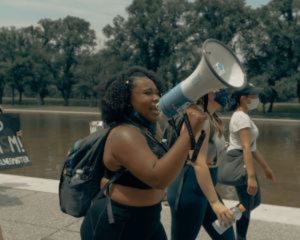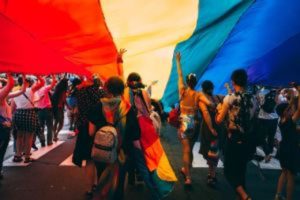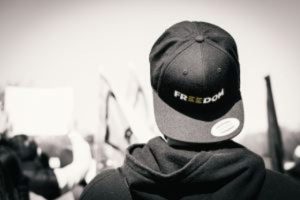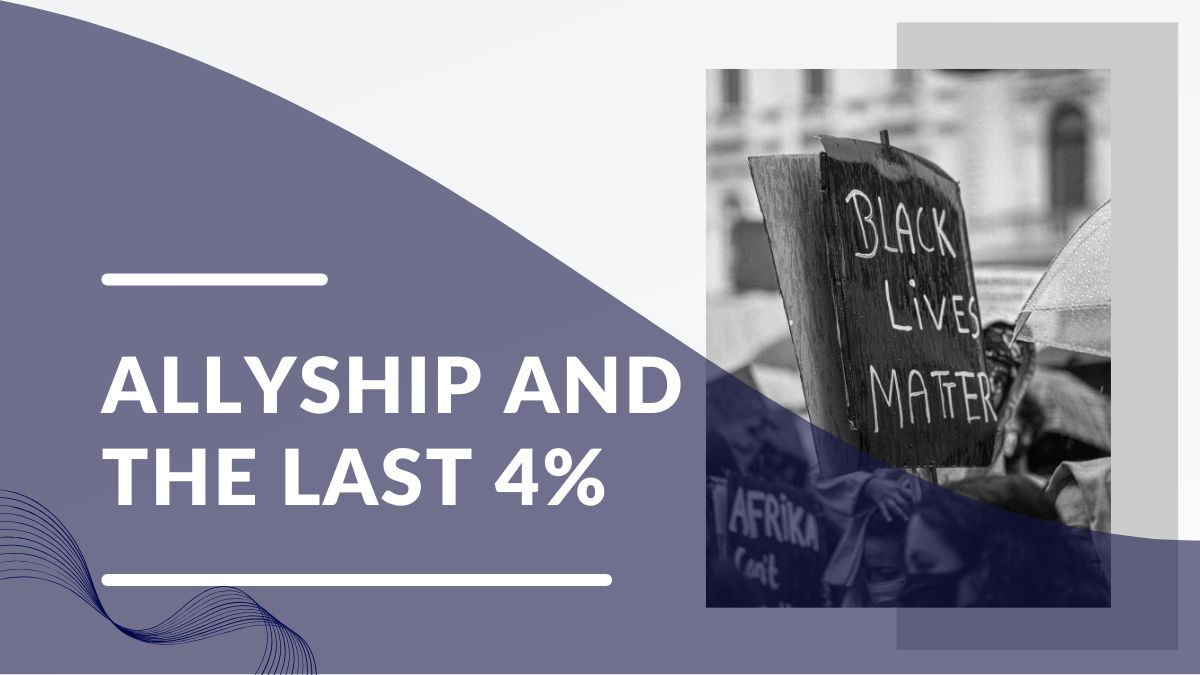The Startling Reality of Commitment to Allyship.
Only 4% of people who claim to be allies have the temerity to last more than a news cycle.
I recently read an article from Theresa M. Robinson who does work specifically around empowering and coaching White would-be allies in their equity journey.
Theresa M. Robinson’s Experiment
In it, she shares what happened when she invited white folks into a 12-month coaching space to challenge the boundaries of their advocacy for BIPOC folks. In her LinkedIn post where she shared the article, she had us make hypotheses about what we think she discovered (prior to reading the piece).
Having experienced my own interactions holding spaces for white people around racial justice, my hypotheses were biased towards the discoveries I have made in this work; resetting boundaries and the need to continuously play defense to the harm that spills over while holding spaces for white bodies.
After reading her take, these were not the biggest takeaways that Theresa’s reflection revealed. What it did reveal was the apparent exceptionalism required for allies to demonstrate any type of stamina in their journey towards accountability in this fight for justice. Robinson said she opened her container by taking applications and received over 70 from eager white folks proclaiming they were ready to take up the mantle for racial justice. Many were disqualified quickly (tokenism, virtual signaling, cookie hunters), but by the end of the program, 13 completed the full year. Robinson could only vouch for three. From 70 who raised their hand to 3 who she could rely on to stand by her. 4 percent
After reading the article, I commented on the post again.
“From 70 to 13 . . .microcosm for the whole world these last 3 years”
Reflecting on the Racial Reckoning
What Robinson bore witness too is a literal microcosm for the “Racial Reckoning” journey we’ve all witnessed in the last three years on a much larger scale. While the Covid-19 lockdown kept our attention wrapped on our collective experience, especially that of the injustices consistently enacted on specific communities (BIPOC, LBTQIA+, femme), it didn’t hold our attention or our fervent action for long.

If we zoom out and examine the last 3 years in context of the larger historical timeline of social justice movements, I think you can all agree. This reckoning was not a movement. The reckoning was more of a reflection, a momentary thought; passing at best, intrusive at worst. It’s like the whole world saw one too many violent scenes and said,
“Can we change the channel now? This is sooooo boring.”
A temporary lapse in our collective self-centeredism to the point that now, only 3 years later (George Floyd was murdered May 25, 2020) we can reflect on our progress and see that in fact, we have barely moved the needle.
Setbacks in Social Justice
As of this writing, the United States has hustled backwards on social justice and civil rights not just systemically but with a speed that can only be compared with the ‘whitelash’ associated with the rise of Trump and the associated xenophobia and diversity mongering that has been steadily on the rise since the end of the Obama presidency.
- Challenging Voter suppression policies got harder (Brnovich v. Democratic National Committee) 2021

- Women lost rights to their bodily autonomy with the reversal of Roe V Wade (Dobbs v. Jackson Women’s Health Organization) 2022
- Colleges lost the ability to blatantly correct for racial discrimination through the higher education system (Students for Fair Admissions v. President and Fellows of Harvard College and Students for Fair Admissions v. University of North Carolina) 2023
- Over 100 anti LGBTQ bills have been passed in state legislatures from 2018-present. More than 50 in the last 12 months
- Over 800 book titles have been banned or removed from public school systems. 30% of the unique titles banned are books about race, racism, or feature characters of color. Meanwhile, 26% of unique titles banned have LGBTQ+ characters or themes. According to PEN America
It’s like America was forced to look at its ugly problems and deficiencies and instead of getting down to work to fix them, took two steps forward and then quickly plugged their ears and said “la la la la la la” . It is the literal interpretation of see no evil, hear no evil, speak no evil. Choosing to ignore and erase, instead of acknowledging and reconciling is just. . . . easier. And you know Americans like easy. #truthbomb
The Rise of the Term ‘Allyship’
And yet, dictionary.com says the use of the word allyship is up. Allyship was the dictionary.com 2021 word of the year in fact. What is your definition of allyship? What does it mean to be an advocate? To advocate? One thing is certain, you cannot be an ally and a bystander at the same time. You do have to move your body into action, and sacrifice some of your comfort (both emotional and physical) along the way. And there’s the rub. Allyship costs you something. Second American truth bomb: there’s no such thing as a free lunch.
The truth is, no one of us can be free until everybody is free. – Maya Angelou
The True Cost of Allyship

Do we actually believe that ‘none of us are free until we are all free’? Because as Robinson demonstrated, many of us would like to think we are willing to stand on the front lines. The idea of defending ‘our freedom’ is as American as apple pie. But as time passes, and the struggle continues only 3 out of 70 can be relied upon to keep standing. There are only 4% who will withstand the discomfort of personal sacrifice for more than a moment.
Just like Robinson, after 12 months, I think many of us after 3 years, are sorely disappointed with the rank and file of our so-called “allies’. Like any breakup when you think the person you are in a relationship with is your ride or die, to find out they just aren’t. . .well.
Elton said it best:
You know I’m still standin’ better than I ever did
Lookin’ like a true survivor, feelin’ like a little kid
And I’m still standin’ after all this time
Pickin’ up the pieces of my life without you on my mind
I don’t think the facts of these numbers are depressing, more so just helpful data (as all data is). Better to know than to misplace hope. To know that most folks won’t stand with you when the going gets tough, or even when the going gets going, you can use that. But, like the song says, we can’t let those who have disappointed us before, continue to rent space in our mind for too long. There’s too much work to do for that. Let the energy we give them last no more than a moment.
Allyship Assessment
High Tides does offer a free allyship assessment for those seeking to reflect on these themes and truly challenge themselves on where they could take a firmer stand (or stand at all). You can reflect on your own allyship journey here.
The Call to Be Accomplices, Not Just Allies
Someone once said that to be an ally is a passive thing, but to be an accomplice is to have skin in the game. An accomplice has something to lose by their participation – they know that their liberation is inextricably tied to that of the person next to them. Let’s try our best to hold that thought for longer than a moment. All 4% of us.





0 Comments